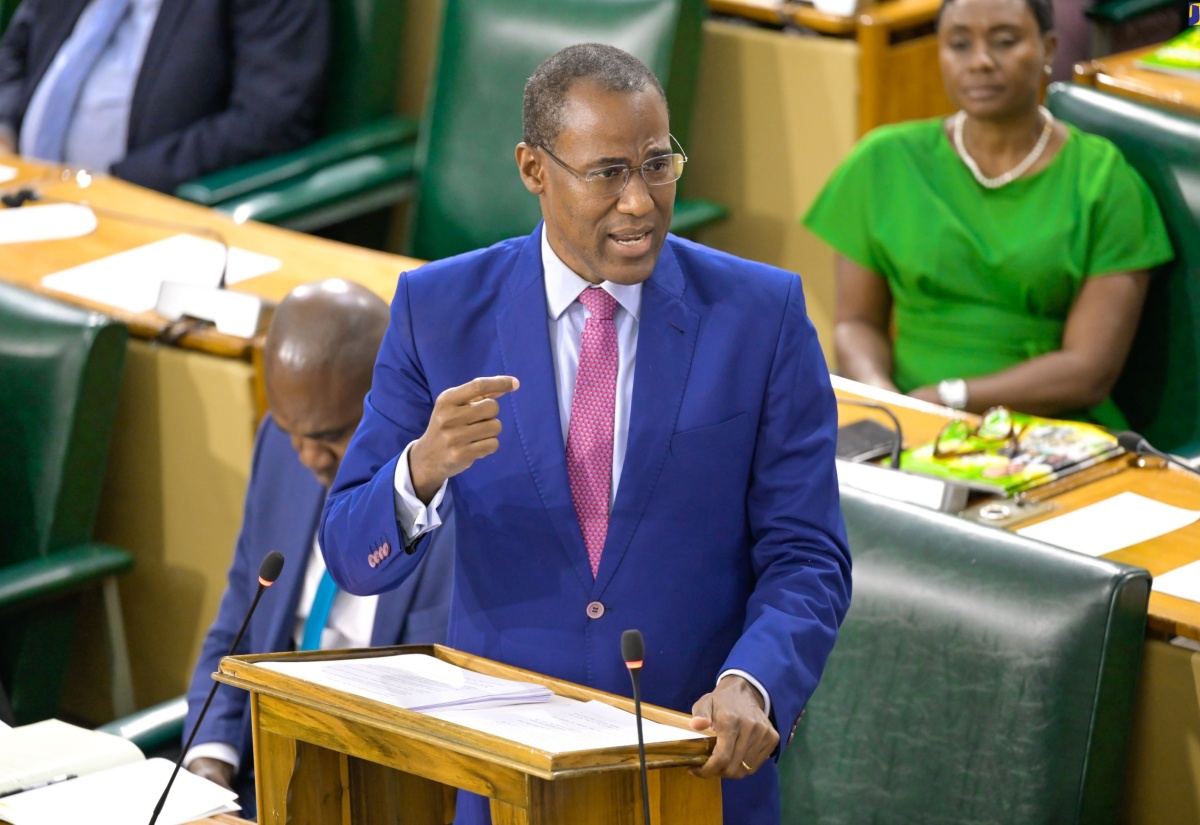Positive Public Feedback to Announced SLB Guarantor Policy Change
By: , March 27, 2024The Full Story
There is positive public feedback to the Government’s announcement that come April 1, 2024, Students’ Loan Bureau (SLB) applicants will no longer require a guarantor to access tertiary financing.
The policy change was announced by Minister of Finance and the Public Service, Dr. the Hon. Nigel Clarke, during his 2024/25 Budget Debate presentation in the House of Representatives recently.
The move supports the Administration’s policy to improve access to tertiary financing and promotes the expansion of educational opportunities in Jamaica.
Amanda Stewart*, who currently stands as surety for a loan applicant, believes the move is long overdue.
She posits that the requirement for a guarantor has always been a major challenge for loan seekers.
“I am an SLB guarantor, and it is not something I was keen on doing; I was uneasy doing it. I had to sign an agreement to say that if the borrower fails to repay the loan, then I would be obligated to pay.
“Not many people would want that responsibility and would, more than likely, decline to take that on, leaving the potential borrower unable to complete the application process. With the removal of that barrier, it is likely that many more applicants will be able to successfully secure loans from the SLB,” she shares with JIS News.
Student, Lavonne Wright, gave the Government the ‘thumbs up’ for the proposed policy change.
“It’s a great initiative, especially since it allows more prospective students to have access to getting higher education without having the [need] for guarantors who don’t want to have those financial burdens in case of any discrepancy,” she tells JIS News.
Another student, Tory Barclay, notes that removing the requirement is a positive step towards ensuring more students can access higher education without unnecessary barriers.
She adds that it would also alleviate the administrative burden on guarantors who are required to provide numerous pieces of documentation to the loan agency.
Accounts Payable Officer, Sandy Walker, shares that the removal of the requirement is a good decision.
“I actually did not [use] the SLB to finance [my tertiary education] but I know the process to get guarantors is very hard, as my friends faced it. That new decision of ‘no guarantor’ is a good one,” she says.

Ms. Walker argues, however, that the removal of the surety could potentially spark increased levels of loan delinquency.
“It has risks. But I believe the Government can find other ways to get the beneficiaries to be held accountable to pay after [completing] school. The guarantor was what tied people to their loans, removing them opens the door for them to not repay or even run away. So tie the loan to something else, like a job,” she suggests.
Law-enforcement officer, David Waite*, describes the initiative by the Government as “somewhat bittersweet”.
“On one end, applicants can now forego the extremely tedious task of trying to get someone to be a guarantor, a responsibility that most working-class people strictly avoid. This, for a long time, has been a roadblock to a lot of applicants, and its good that they no longer have to bear that stress.
“On the other end, however, for the continuity of the SLB, the guarantor requirement has aided in securing payment. It [created] an added sense of obligation by the applicant to not let down their guarantor and honour their payments. Also, though unfortunate, SLB [retained] the additional option to retrieve funds via the guarantor,” he states.
Mr. Waite argues that persons are more likely to pay if they stand to disappoint a guarantor, and are less likely to repay if the only repercussion is to themselves.
“In essence, it’s good for prospective applicants, but places the continuity of the SLB in question as it may increase delinquency levels, [reduce] the SLB’s overall liquidity, and force them to [seek] additional government subsidies,” he shares.
Mr. Waite, who was a two-year beneficiary, says though the process was a bit lengthy, once all the documents were submitted in a timely manner, “all went well”.
Industrial Relations Specialist, Dwane Downer*, who was an SLB beneficiary, says the proposed change will make the process easier for prospective applicants.
“I assume it gives a lot of people access who would have otherwise had little or no option,” he shares, while describing the loan he received as a lifeline for financing his university education.
Entrepreneur, Bob Roberts*, says the move is a positive one, as the student’s academic future is no longer in jeopardy when they are unable to identify a willing guarantor.
“To find a guarantor was a daunting task. Family members refused to be my beneficiary, as they had strong reservations on the potential obligation that they would be committing to pay the loan if I, as the borrower, defaulted,” he shares.
Mr. Roberts points out that underemployment or unemployment can negatively impact a loan recipient’s ability to honour their monthly obligation to the Bureau.
“Now, I have seen this scenario cause serious fallout among family members when they get letters from the SLB indicating arrears; without investigating the student’s situation, they begin to be obnoxious and this results in strained relationships,” he says.
Secretary, Camele Soltau, says removal of the guarantor requirement could have a significant impact on future students registering with the Bureau.
“I think it’s a good move. I support the decision of them removing the guarantors for persons to get their student loans,” she says.

Ms. Soltau welcomes additional details on the new policy change and the measures that will be implemented for loan repayment.
While commending the Government for the announced policy change, medical employee, Steven Howard*, says he is also awaiting further information regarding the proposed arrangement.
“It’s a good thing, if it will allow more persons to access the loan. The question I have is, what additional measures will be put in place to ensure compliance?” he tells JIS News.
In making the announcement, Dr. Clarke maintained that the guarantor requirement for student loans is regressive, noting that it discriminates against low-income families who cannot easily, if at all, find guarantors.
“The policy has been in place for several decades and we are happy to abolish the requirement for guarantors for student loans,” he said.
Dr. Clarke shared that an assessment of copious amounts of data related to SLB delinquency revealed that payments are rarely made by guarantors.
“In all, but a few instances, guarantors have served the purpose of locating students,” he added.
In recent years, the Government has made changes to improve access to tertiary financing.
In the 2022/23 Budget, the Government removed the guarantor requirement for all applicants who are wards of the State.
“Within the 12 months of that policy change, the number of wards of the State who applied to the SLB increased by 100 per cent from 46 to 98,” Dr. Clarke said.
Last year, the guarantor requirement was removed for applicants from Programme of Advancement Through Health and Education (PATH) households.
The number of PATH beneficiaries who have accessed the SLB climbed from 192 to 547 in fiscal year 2023/24, representing a 185 per cent increase.
*Names changed on request


